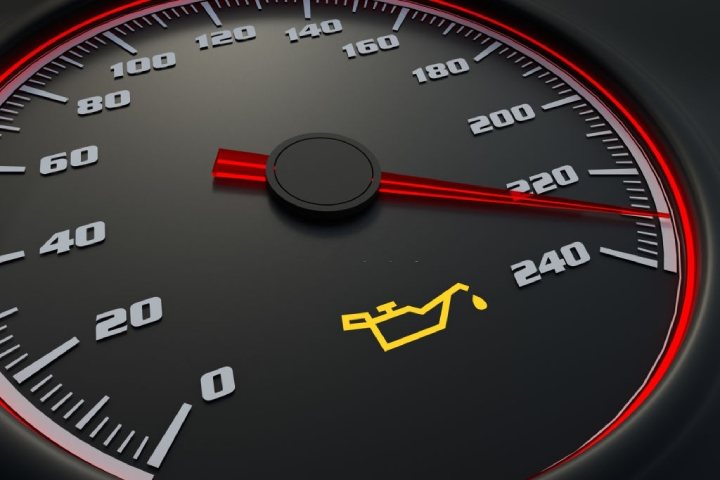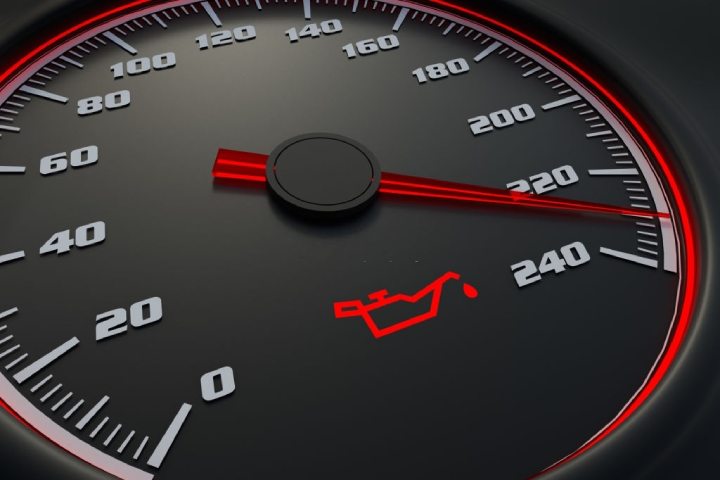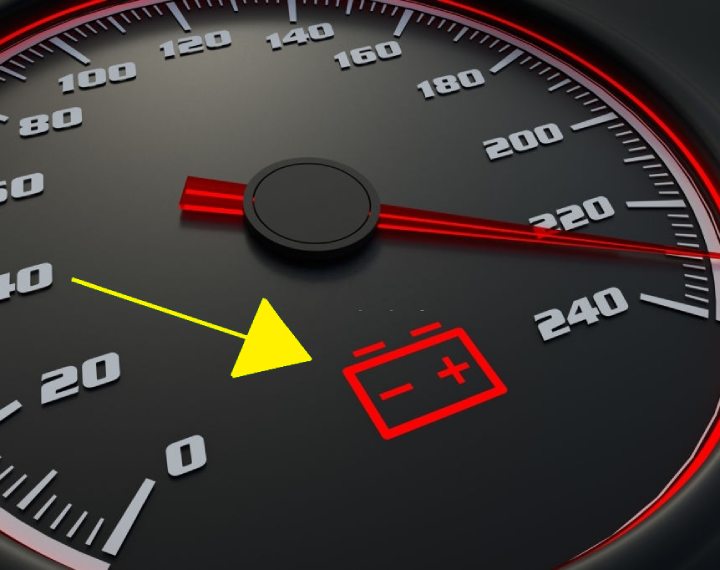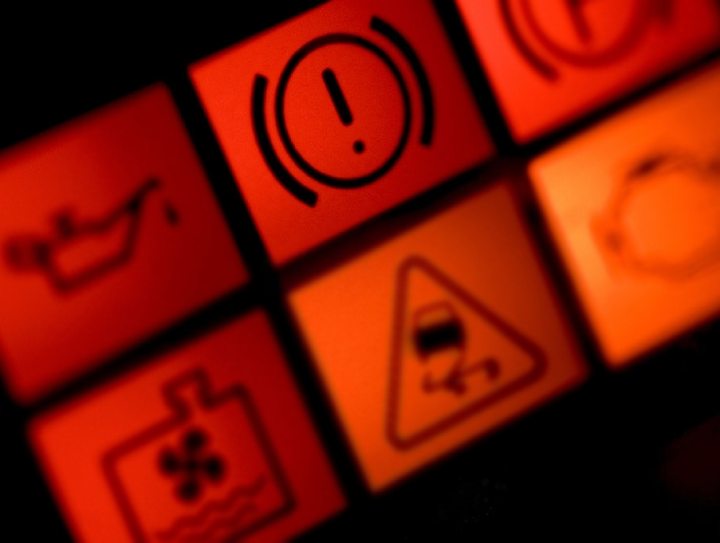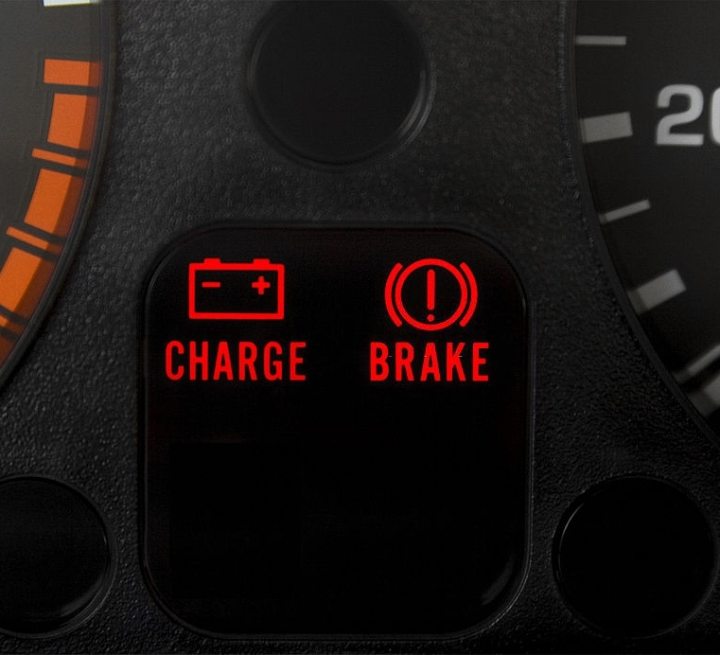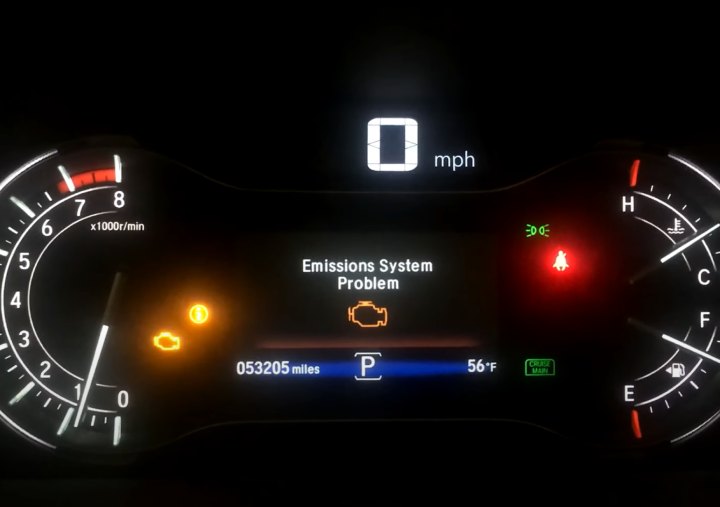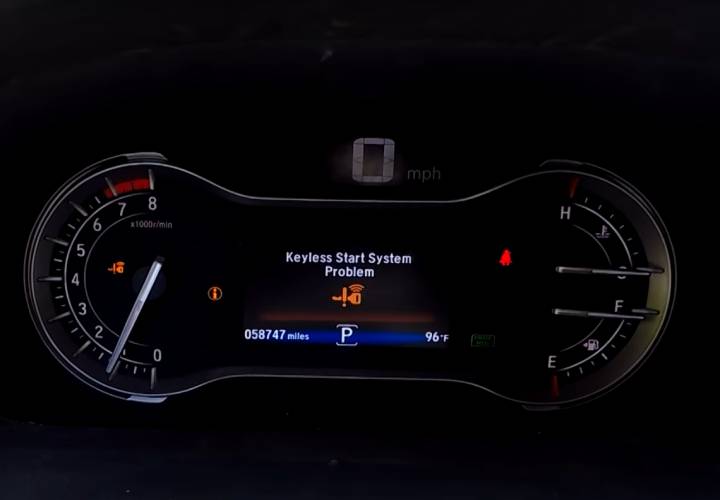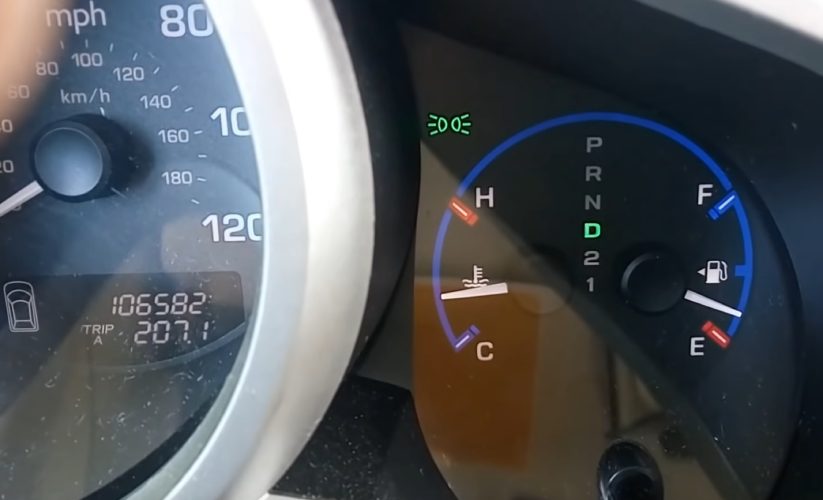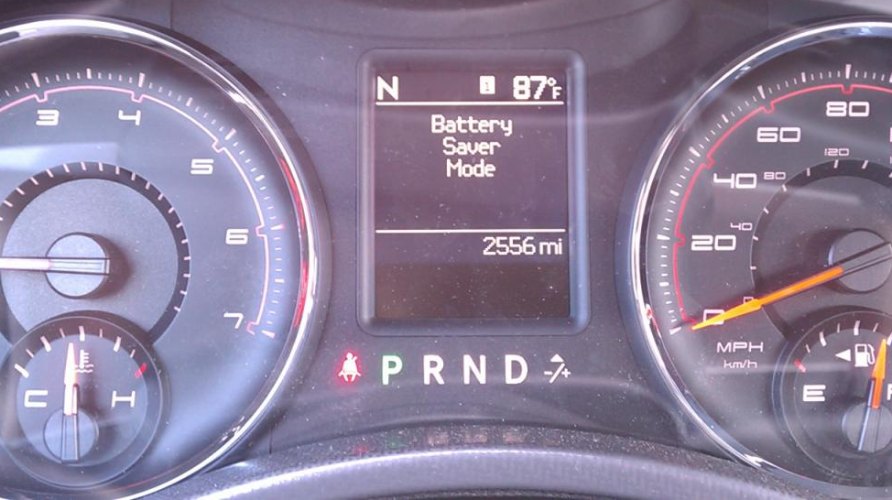A battery discharge warning typically refers to an alert displayed on your vehicle dashboard. It generally occurs when a vehicle’s battery is draining quicker than it can be recharged or has reached a critically low charge level. You can fix this by turning off headlights, car radio, or climate control. If the problem persists, you might have a bad battery that needs replacing.
There can be multiple reasons for the battery discharge warning light, mainly the radio running when the engine is OFF. Other reasons include having the headlights ON or chargers left plugged in while the vehicle is stationary.
Some cars come with a Battery Saver Active function, which will put the vehicle in battery saver mode. This will turn off non-essential electrical accessories to preserve the battery.
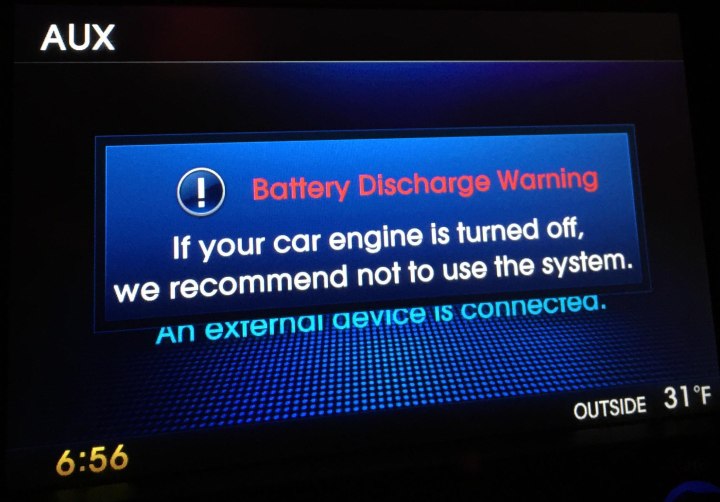
Battery Discharge Warning When the Engine Is Off
Here are the reasons that might cause your car to display this error when the engine is off:
01. Listening to the radio while parked
Listening to your car’s radio while parked is the most common cause of this warning. When the engine is off for extended periods, the battery will lose its charge. To prevent your battery from draining, you should monitor its state of charge and start the engine periodically.
The duration for which you can listen to the radio without receiving this warning will depend mainly on the battery’s ability to hold its charge, as well as the power consumption of the radio and other accessories in use.
02. Headlights left ON
Leaving the headlights on while the engine is off can quickly drain your vehicle’s battery resulting in a battery discharge warning. This will depend on the battery’s age and capacity, and in some cases, even the outside temperature can have an impact. Eventually, your battery won’t be able to start the vehicle, leaving you stranded.

To prevent battery discharge and potential roadside breakdowns, make sure your headlights are off before leaving the car. Most modern vehicles come with automatic headlights as standard, so if your car is equipped with this feature, you should be safe.
03. Chargers left plugged in
Although they don’t consume a lot of power, any chargers left plugged in will cause the battery to slowly lose its charge. Modern vehicles do come with a feature that will shut the power to the cigarette lighter or USB ports when the ignition is off, but there are still cars out there that lack this feature.
Now, you might think that leaving the charger plugged in without a device connected might be alright. Well, think again! Some chargers will still draw small amounts of energy. This phenomenon is known as “phantom load”. For example, if you leave any chargers plugged in while the car has been parked for a week or more, it is possible that the car’s battery will lose its charge completely. You will then need to jumpstart the vehicle!
04. Climate control left ON
Depending on your battery’s condition, leaving the climate control ON while the engine is stopped will cause the 12v battery to drain. Modern cars have a feature that will shut the climate control system off as soon as the engine stops running, but this is not the case for older vehicles.
If you had the climate system running with the engine off, that might be the reason for the battery discharge warning.
05. Parasitic drain
As we mentioned parasitic drain already, let’s look at what other components of your car might cause this phenomenon. Parasitic drain occurs whenever an electrical device or component of the car keeps drawing power even though the ignition is off. Although this process happens on every car, excessive current draw can drain your battery overnight, leaving you with a completely dead battery.
So what can cause this so-called parasitic drain? It is the result of relays or switches that won’t turn off completely, a bad alternator, or any after-market devices such as interior lighting LEDs, amplifiers or media units.
06. Loose terminals
Loose battery terminals pose a serious risk to your vehicle – as they can prevent the car from starting, resulting in a battery discharge warning. You might notice that some of the electrical systems such as radio or climate systems, won’t work properly. Sometimes, even the headlights might seem a bit dimmer than usual.
Ultimately, the alternator might have difficulties charging the battery if any of the connections are loose.
07. Extreme Weather
Sometimes the battery discharge isn’t in your control. Extreme weather is an act of nature. When it is too hot or too cold, it can harm the charging of the car’s battery. As things can get too technical if we delve into the chemical reactions of the battery when the temperature reaches extreme limits. The gist of it is that due to the chemical reactions, the error can appear on your dashboard. Ideally, you should park your vehicle in a garage during the winter to prevent battery discharge from happening.
08. Old Battery
An old battery is another cause of unusual battery discharge. The cells cycle of an aging battery is almost nearing the end. It can get discharged sooner than usual. As soon as you park the car, the battery will lose its charge.

Battery Discharge When Driving
Let’s see what are the different scenarios where you could get a battery discharge warning while driving.
01. Poor Ground Connection
Ground connections play an important role in protecting the car against potential fires due to a short circuit. But a poor ground connection can cause your battery to discharge while driving. It is important to secure a solid connection to the vehicle’s frame in order to complete the electrical circuit. A loose or poorly secured ground connection can definitely throw the battery discharge warning.
02. Short Drives
Driving the car charges the battery; it is true. But short drives do the opposite of that. They don’t give enough time for your car’s battery to get charged. And if you use stereo or charging ports on this short drive, then it is most likely you will end up with a discharged battery. The fix for this is to simply keep driving the car for at least 30 minutes and the error should go away. If that doesn’t work, trickle charging the battery might do the trick.
03. Faulty Charging System
Now let’s dive into more complex causes, starting with the faulty charging system. The car’s charging system consists of several components, such as starter motors, alternators, and sensors. When any of these components aren’t working correctly, your battery will be discharged sooner than expected.
04. Corroded Battery Terminals
The physical condition of the battery’s terminals is also important. If battery terminals are corroded or have a white deposit on their surface, then it won’t allow the battery to charge properly. Even when the car is running, the battery will not receive any charge.
You can clean your terminals using a wire brush and some mixed baking soda. Ensure to apply some dielectric grease after you’re done cleaning. This will prevent any corrosion from building up again in the future.
05. Worn-out Serpentine Belt
A worn-out serpentine belt reveals itself in the form of a drained battery. It is mainly responsible for providing power to the alternator, which then makes the current. If power is lost in slippage, the battery isn’t charged correctly.
I recommend inspecting your serpentine belt every couple o months to ensure there are no signs of damage. Cracks, glazing or fraying will render the belt useless.
06. Weak Battery
A weak battery would not charge anyways. No matter how much you drive, even if the alternator and serpentine belt are working correctly, it would ultimately get drained. Sometimes the battery is old enough that it won’t have the capacity to hold its charge properly. It’s best to get rid of the battery and replace it with a new one.
07. Bad Alternator
An alternator is the main component of a car’s charging system. If its life has ended, it won’t function correctly. An alternator goes out usually after 80,000 miles and stops charging the battery. A faulty alternator will cause your headlights to become dimmer than usual or flicker. Furthermore, a whining noise coming from the front of the vehicle might indicate that your alternator is giving up.
Ultimately, your battery won’t get enough juice and will die. The car won’t start anymore. There are ways to test your alternator if you have the right tools. If not, get a specialist to do it. Some garages even do it for free!
How Do You Fix a Discharged Battery
You can do a few things if your car battery is losing its charge. Following the guide below, you can attempt to fix a battery discharge.
- Check Electrolyte
The first and foremost step is to check the electrolyte levels. How many times it has happened that you didn’t check electrolyte levels in the battery for months. It gets drained, and your car won’t start. The cause being there is no electrolyte in the battery to supply current across terminals.
You might try your local repair garage or Autozone, as they do check batteries for free. This is if your car is still starting!
2. Jumpstart
Jumpstart is the oldest trick in the book to put some life into a discharged battery. Take jump wires and connect your battery to a good battery. If you are lucky enough, the car will start, and once it starts, the alternator will start doing its job.
3. Get it Recharged
If nothing is working, then try to charge the battery externally. Multiple external DC chargers are available in the market. Or you can visit a battery shop where they will charge it for $10-20 to trickle charge your battery.
4. Replace the Battery
This is the last resort if nothing is working. You checked electrolyte; you tried to jumpstart it and tried charging it. The car starts, but the battery is drained as soon as you turn off the engine. Then it’s time to get a new battery.
When is time to replace the battery, your Battery Warning light will come on as well, indicating there is a problem with your electrical system.
This will cost you between $45 to $250, depending on the make and model of your car.
What car models have this common problem?
Kia models are well known for getting the battery discharge warning message when using the radio or other electronic devices while stationary. While this is a good thing, the message can get annoying as there is no way to turn it off.
Another popular car maker that has this common problem is Hyundai. As reported on Hyundai Forums by multiple owners, most Hyundai models will alert you as soon as your engine is OFF and the AC is running or listening to the radio.
Other popular automakers with this issue include BMW, Ford, Honda, and Toyota.
References
What causes a car battery to drain?
Engineering Coordinator with 5+ years of experience in the automotive manufacturing industry. Currently supporting vehicle development and new model launch activities at Honda Development and Manufacturing of America. Skilled at managing engineering teams, overseeing prototype builds, coordinating testing, and driving continuous process improvements. LinkedIn

